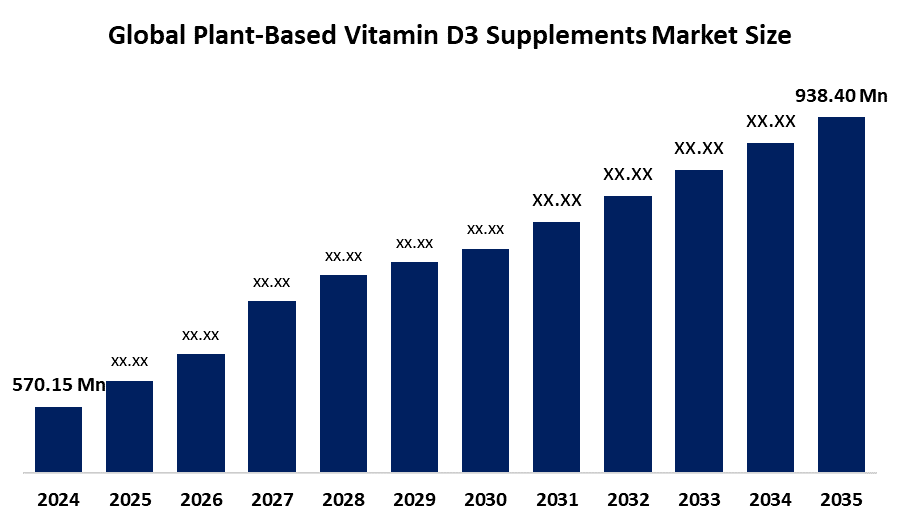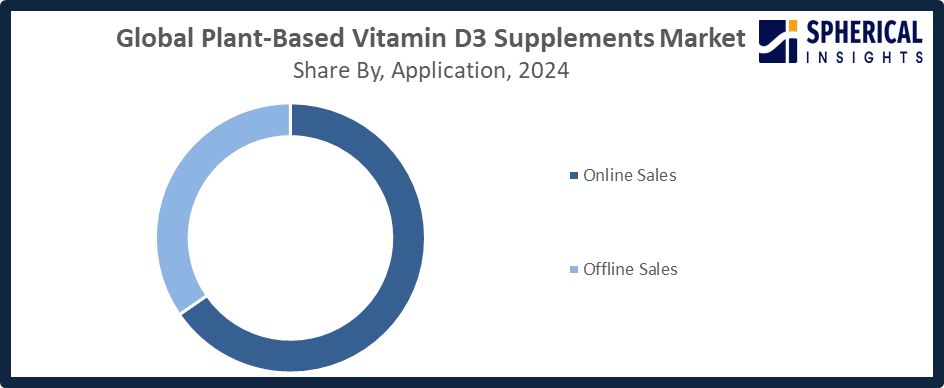Global Plant-Based Vitamin D3 Supplements Market Size, Share, and COVID-19 Impact Analysis, By Product Type (Liquid Preparations, Tablets, and Others), By Application (Online Sales and Offline Sales), and By Region (North America, Europe, Asia-Pacific, Latin America, Middle East, and Africa), Analysis and Forecast 2025 - 2035
Industry: HealthcareGlobal Plant-Based Vitamin D3 Supplements Market Insights Forecasts to 2035
- The Global Plant-Based Vitamin D3 Supplements Market Size Was Estimated at USD 570.15 million in 2024
- The Market Size is Expected to Grow at a CAGR of around 4.63 % from 2025 to 2035
- The Worldwide Plant-Based Vitamin D3 Supplements Market Size is Expected to Reach USD 938.40 million by 2035
- Asia Pacific is expected to grow the fastest during the forecast period.

Get more details on this report -
According to a research report published by Spherical Insights and Consulting, the global plant-based vitamin D3 supplements market size was worth around USD 570.15 million in 2024 and is predicted to grow to around USD 938.40 million by 2035 with a compound annual growth rate (CAGR) of 4.63 % from 2025 to 2035. Opportunities in the market for plant-based vitamin D3 supplements include growing veganism, increased health consciousness, technological developments in algal sourcing, regulatory support for natural ingredients, and growing consumer demand for nutritional products that are ethically and sustainably sourced.
Market Overview
The global sector devoted to the manufacturing, distribution, and consumption of vitamin D3 obtained solely from non-animal sources, primarily algae and lichen, is known as the "plant-based vitamin D3 supplements market." The market for plant-based vitamin D3 supplements includes vegan-friendly nutritional products made from lichen or algae that provide cholecalciferol (D3) to treat vitamin D deficiency without using lanolin obtained from animals. New developments include biofortified vitamin D-enriched tomatoes launched globally as deficiency persists, with 40% of Europeans and 25% of U.S. adults affected; supplementation reaches 26% of U.S. children aged 2–5, highlighting urgent public-health priorities. According to the U.S. NIH Office of Dietary Supplements launched its 2025–2029 strategic plan, fueling plant-based fortification research. Meanwhile, the FDA’s September 2025 amendment allows D3 addition to cultured dairy, expanding accessibility. Growing consumer preferences for vegan and vegetarian diets, growing knowledge of vitamin D deficiency, and increased use of plant-derived cholecalciferol generated from algae and lichens all contribute to the plant-based vitamin D3 supplements market expansion. The market for plant-based vitamin D3 supplements is growing as people look for alternatives to conventional lanolin-derived vitamin D3 and adopt vegetarian and vegan lifestyles.
Report Coverage
This research report categorizes the plant-based vitamin D3 supplements market based on various segments and regions, forecasts revenue growth, and analyzes trends in each submarket. The report analyses the key growth drivers, opportunities, and challenges influencing the plant-based vitamin D3 supplements market. Recent market developments and competitive strategies, such as expansion, product launch, development, partnership, merger, and acquisition, have been included to draw the competitive landscape in the market. The report strategically identifies and profiles the key market players and analyses their core competencies in each sub-segment of the plant-based vitamin D3 supplements market.
Global Plant-Based Vitamin D3 Supplements Market Report Coverage
| Report Coverage | Details |
|---|---|
| Base Year: | 2024 |
| Market Size in 2024: | USD 570.15 Million |
| Forecast Period: | 2024 – 2035 |
| Forecast Period CAGR 2024 – 2035 : | CAGR of 4.63% |
| 024 – 2035 Value Projection: | USD 938.40 Million |
| Historical Data for: | 2020-2023 |
| No. of Pages: | 250 |
| Tables, Charts & Figures: | 110 |
| Segments covered: | By Product Type, By Application |
| Companies covered:: | Biogen, Cytoplan, DR. VEGAN, Healthspan, Inlife Pharma, Land Art, Lamberts Healthcare, Life Extension, Nordic, Solgar, Sweet Cures, Vegetology, And Other Players |
| Pitfalls & Challenges: | COVID-19 Empact, Challenge, Future, Growth, & Analysis |
Get more details on this report -
Driving Factors
The market for plant-based vitamin D3 supplements is fueled by a confluence of changing consumer tastes, scientific discoveries, and governmental backing. The growing demand for non-animal, ethically produced nutritional supplements is mostly driven by the global shift toward vegan, vegetarian, and flexitarian diets. Plant-based supplements may now reach a broader range of consumers, such as those looking for bone-health blends, immune-support formulations, and holistic wellness products, thanks to the growth of e-commerce and direct-to-consumer health firms. Growing awareness of vitamin D insufficiency around the world, particularly in areas with little exposure to sunlight, increases demand for daily supplements.
Restraining Factors
The market for plant-based vitamin D3 supplements is restricted by a number of factors, including increased production costs, a shortage of raw materials, technical difficulties in extraction and stabilization, consumer reservations about the products' effectiveness, and competition from well-known animal-derived vitamin D3 products.
Market Segmentation
The plant-based vitamin D3 supplements market share is classified into product type and application.
- The tablets segment accounted for the largest share in 2024 and is anticipated to grow at a significant CAGR during the forecast period.
Based on the product type, the plant-based vitamin D3 supplements market is divided into liquid preparations, tablets, and others. Among these, the tablets segment accounted for the largest share in 2024 and is anticipated to grow at a significant CAGR during the forecast period. The longer shelf life, consistent dosage, and compatibility with established supplement distribution routes, tablets commonly used. They continue to be the most popular format for daily nutritional supplements and are preferred by customers looking for affordable and consistent ingestion.
- The online sales segment accounted for the highest market revenue in 2024 and is anticipated to grow at a significant CAGR during the forecast period.
Based on the application, the plant-based vitamin D3 supplements market is divided into online sales and offline sales. Among these, the online sales segment accounted for the highest market revenue in 2024 and is anticipated to grow at a significant CAGR during the forecast period. Online supplement purchases have increased due to the expansion of e-commerce and the growing consumer preference for home delivery of nutritious products. Digital platforms provide a range of products, clear ingredient information, and replenishment services based on subscriptions.

Get more details on this report -
Regional Segment Analysis of the Plant-Based Vitamin D3 Supplements Market
- North America (U.S., Canada, Mexico)
- Europe (Germany, France, U.K., Italy, Spain, Rest of Europe)
- Asia-Pacific (China, Japan, India, Rest of APAC)
- South America (Brazil and the Rest of South America)
- The Middle East and Africa (UAE, South Africa, Rest of MEA)
North America is anticipated to hold the largest share of the plant-based vitamin D3 supplements market over the predicted timeframe.

Get more details on this report -
North America is anticipated to hold the largest share of the plant-based vitamin D3 supplements market over the predicted timeframe. North America is determined by several socioeconomic and health-related issues. Consumer demand for efficient nutritional supplements has increased due to the region's high prevalence of lifestyle-related illnesses and general knowledge of vitamin D insufficiency. In 2025, the NIH Office of Dietary Supplements launched its 2025–2029 Strategic Plan, emphasizing plant-derived vitamin D fortification research to address deficiencies affecting 35% of U.S. adults and 17.5% of non-Hispanic Black populations. The growing popularity of vegan, vegetarian, and flexitarian diets is a major factor in the preference for plant-based sources of vitamin D3 over traditional animal-based ones. In 2025, the FDA authorized 178 IU/100g D3 in cultured dairy and standardized plant-based milk labeling, significantly enhancing accessibility and market growth.
Asia Pacific is expected to grow at a rapid CAGR in the plant-based vitamin D3 supplements market during the forecast period. The Asia Pacific region is characterized by a number of factors, including economic, health, and demographic ones. The market for dietary supplements has increased due to growing health consciousness and the rising incidence of vitamin D insufficiency in nations like China, India, and Japan. In 2025, India’s FSSAI approved pine-derived vegan D3 fortification to combat 82.67% deficiency, while China’s National Health Commission launched a USD 150 million algal D3 program, addressing 70% adult inadequacy in urban regions.
Competitive Analysis:
The report offers the appropriate analysis of the key organizations/companies involved within the plant-based vitamin D3 supplements market, along with a comparative evaluation primarily based on their product offering, business overviews, geographic presence, enterprise strategies, segment market share, and SWOT analysis. The report also provides an elaborative analysis focusing on the current news and developments of the companies, which includes product development, innovations, joint ventures, partnerships, mergers & acquisitions, strategic alliances, and others. This allows for the evaluation of the overall competition within the market.
List of Key Companies
- Biogen
- Cytoplan
- DR. VEGAN
- Healthspan
- Inlife Pharma
- Land Art
- Lamberts Healthcare
- Life Extension
- Nordic
- Solgar
- Sweet Cures
- Vegetology
- Others
Key Target Audience
- Market Players
- Investors
- End-users
- Government Authorities
- Consulting and Research Firm
- Venture capitalists
- Value-Added Resellers (VARs)
Recent Development
- In August 2025, Vitanergy Health US Inc. launched three vegan-friendly, plant-based Vitamin D3 supplements supporting women’s daily nutrition, now available on Amazon, Walmart, Flaire.com, and its FDA-registered, cGMP-compliant U.S. facilities.
Market Segment
This study forecasts revenue at global, regional, and country levels from 2020 to 2035. Spherical Insights has segmented the plant-based vitamin D3 supplements market based on the below-mentioned segments:
Global Plant-Based Vitamin D3 Supplements Market, By Product Type
- Liquid Preparations
- Tablet
- Others
Global Plant-Based Vitamin D3 Supplements Market, By Application
- Online Sales
- Offline Sales
Global Plant-Based Vitamin D3 Supplements Market, By Regional Analysis
- North America
- US
- Canada
- Mexico
- Europe
- Germany
- UK
- France
- Italy
- Spain
- Russia
- Rest of Europe
- Asia Pacific
- China
- Japan
- India
- South Korea
- Australia
- Rest of Asia Pacific
- South America
- Brazil
- Argentina
- Rest of South America
- Middle East & Africa
- UAE
- Saudi Arabia
- Qatar
- South Africa
- Rest of the Middle East & Africa
Frequently Asked Questions (FAQ)
-
1. What is the CAGR of the plant-based vitamin D3 supplements market over the forecast period?The global plant-based vitamin D3 supplements market is projected to expand at a CAGR of 4.63% during the forecast period.
-
2. What is the market size of the plant-based vitamin D3 supplements market?The global plant-based vitamin D3 supplements market size is expected to grow from USD 570.15 million in 2024 to USD 938.40 million by 2035, at a CAGR of 4.63 % during the forecast period 2025-2035.
-
3. Which region holds the largest share of the plant-based vitamin D3 supplements market?North America is anticipated to hold the largest share of the plant-based vitamin D3 supplements market over the predicted timeframe.
-
4. Who are the top 10 companies operating in the global plant-based vitamin D3 supplements market?Biogen, Cytoplan, DR. VEGAN, Healthspan, Inlife Pharma, Land Art, Lamberts Healthcare, Life Extension, Nordic, Solgar, Sweet Cures, Vegetology, and Others.
-
5. What factors are driving the growth of the plant-based vitamin D3 supplements market?Rising vegan and vegetarian adoption, increasing Vitamin D deficiency awareness, technological advances in algal and lichen extraction, regulatory support for natural ingredients, and growing consumer preference for sustainable, ethical supplements.
-
6. What are the market trends in the plant-based vitamin D3 supplements market?Expansion of plant-based fortification, biofortified functional foods, clean-label formulations, e-commerce growth, personalized nutrition, and rising collaborations between nutraceutical companies and research institutions.
-
7. What are the main challenges restricting the wider adoption of the plant-based vitamin D3 supplements market?High production costs, limited raw material availability, technical difficulties in extraction and stabilization, consumer skepticism regarding efficacy, and competition from established animal-derived Vitamin D3 supplements.
Need help to buy this report?